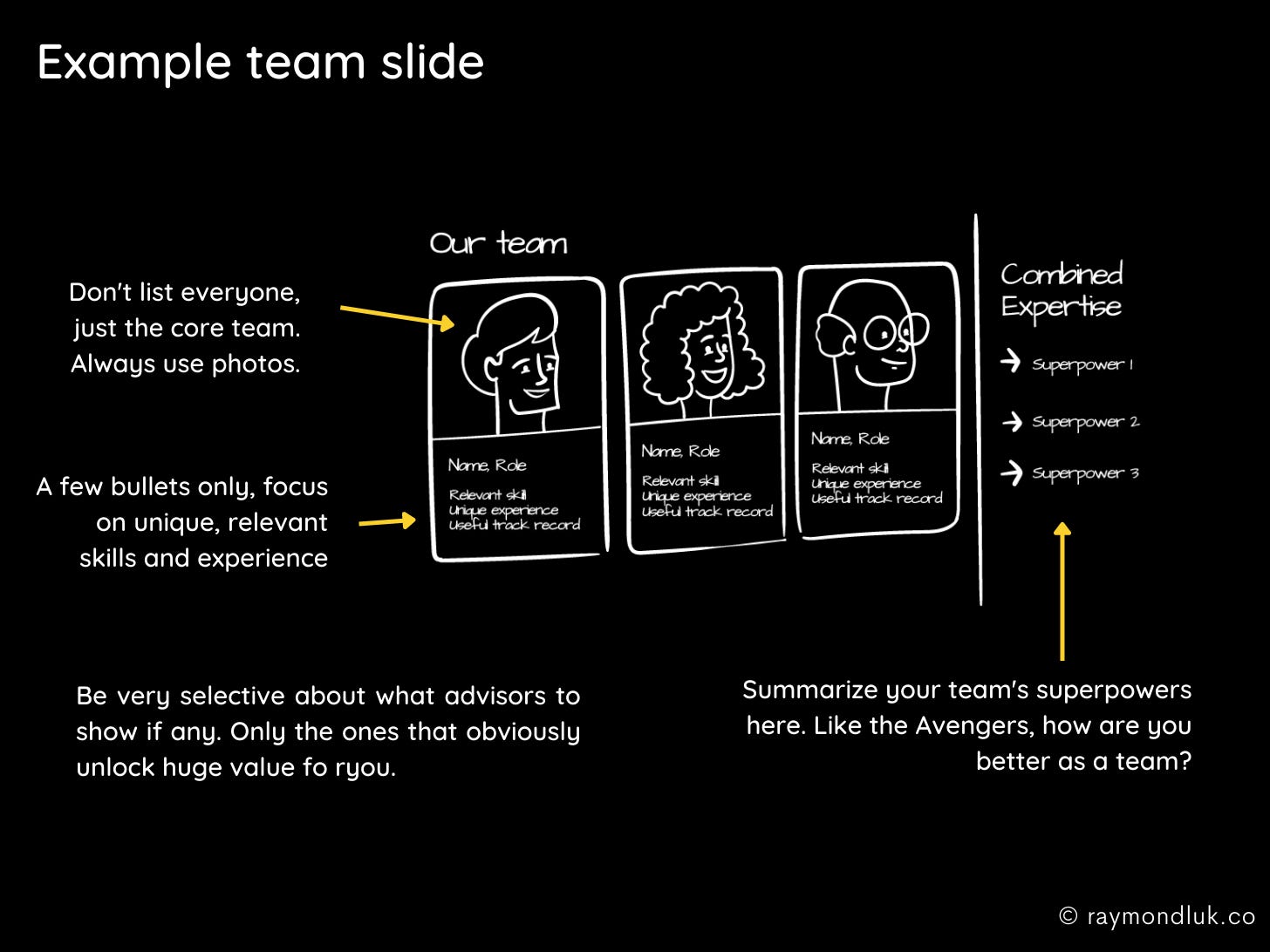This is part 10 of a series that walks through the slides in a pitch deck. See Start With the Problem, and Your Startup’s DNA: The Solution Slide, How Not to Waste Your Product Slide, Why Now: Change is the Key to your Pitch, The Market Size Dilemma, How Not to Lie To Yourself About Competition, Telling the Story of How You Make Money, You've built a better mousetrap, now you need to go to market, and How to talk about financial projections in your pitch deck.
A lot of VCs describe their process as finding a big market and finding the right team to go after it. If you’ve made it this far in the pitch the focus is now on you. Why are you, and not someone else, the best suited to take advantage of this opportunity?
As early as the Solution slide I make a mental note to go look at the Team slide to see how they’re related. My logic is this: whatever you said was awesome about your startup had to come from somewhere (or someone). I want to get to know that person.
If you heavily-advertised that AI is part of your solution I’m expecting your Team slide to highlight AI expertise. If you make children’s toys, who has a background in supply chain or design (or children)?
The purpose of the Team slide is to answer “Why You?” Every investor has preferences about what they want to see in a founder (more on that below) but you can create a great Team slide if you cover the three Cs: Care, Competence, and Commitment.
Key points I cover:
Example format for a team slide
Why You?
Why do you care?
Why are you competent?
Why are you committed?
Why NOT you?
Subscribe for free to receive weekly posts about pitching, a copy of my ebook Pitching a Leap of Faith, and invites to my Pitch Masterclass.
Example format for a team slide
The biggest mistake people make is overcrowding their Team slide. Put a link to your LinkedIn Profile and focus on what expresses what’s special about you.

Early stage teams are not meant to be complete so don’t feel pressure to fill the slide with advisors and service providers. Use the space to talk about the team you do have and why they matter. Always make a strong statement about why this is the best team in the world to solve this problem.
Why you?

Why do you care?
If we went for lunch and only talked about the problem you’re trying to solve, how long would that conversation last? Salad, dessert or are we still there when they’re prepping for the dinner service?
Showing why you care so much is your personal origin story. Maybe you didn’t start thinking about supply chain optimization when you were eight, but I want to know what made you decide to start this company. This is a window into your creativity, your approach to problem solving, and reveals your passion about this space.
Some pitches start with a personal origin story which can work really well. When you present your Team slide say the words “this is why our team cares so much about this problem.” That will give you a clear idea of what to include.
Why are you competent?
Most Team slides excel at showing education, work experience, and useful skills, i.e. competence. This must be why people feel the need to add lawyers and accountants to their pitch decks (stop doing that).
Remember that being ‘impressive’ is relative. You should mention if you have a PhD in your field, but it’s just as important that other team members have complimentary skills like marketing and sales.
Don’t go overboard with your CV. Competencies are the least important part of the Team slide.
Why are you committed?
Commitment may be something that’s evident by what you gave up, e.g. your founding team all left high-paying jobs to start this company. It could be seen in the other companies you founded or jobs you held in the field.
Even if this is your first startup or you’re early in your career there is an opportunity to show your commitment. Talk about the countless hours spent interviewing customers or getting feedback on your MVP. Talk about the struggle. The willingness to invest time and sometimes money into your dream is an indicator you’ll stick it out long term.
Why not you?

I want to clarify one thing.
I’ve talked about showing investors how you’re the “right” founder but don’t think this means there is a standard for what a founder should be or look like. Unfortunately the VC industry has a terrible track record distributing capital to
I’m tired of hearing founders say they don’t fit the mould of what a founder looks like.
I want to clarify one thing. All the talk about proving you are the right founder can easily lead to discouragement. Especially if you don’t think you fit the ‘standard’ (shaped by our biases) of what a founder should be or look like.
In spite of the very real biases in data about who raises money, it’s not a knock against you that you aren’t male, white, in your 20s. You might live in a small town or didn’t graduate from Harvard. Your first language might not be English. You might look ‘different’ or identify differently by gender or sexuality.
All of who you are has gone into this particular startup that you believe passionately in. Be you, be different and remember that investors (the good ones) look for outliers. They literally invest in different. So there’s no need to chase sameness.




